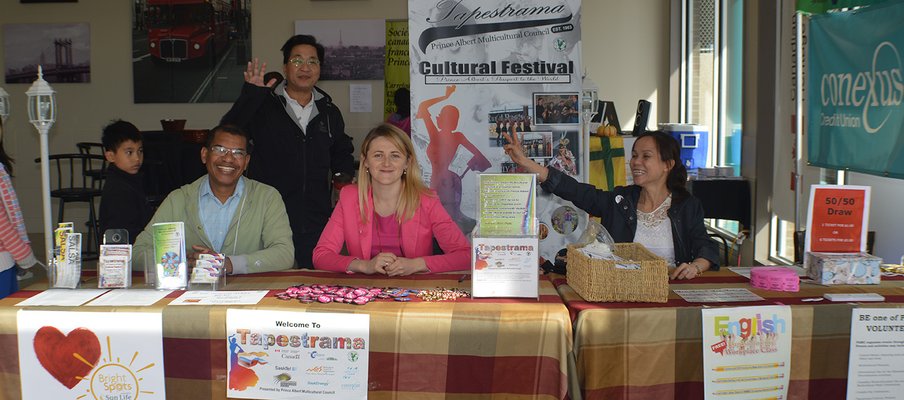
Finding Common Ground
In this issue
 Engage - Volume 6, Issue 1, Fall/Winter 2015
Engage - Volume 6, Issue 1, Fall/Winter 2015
Barriers to connections are being removed as cultural groups find common ground in northern Saskatchewan.
Made possible by SaskCulture’s Multicultural Initiatives Fund, Common Ground is about removing barriers to connections so Indigenous and newcomer participants can learn about each other. "It is important that newcomers meet members from the First Nations community. By building relationships, participants can reject stereotypes and see each other as neighbours, allies and friends," says Rhonda Rosenburg, executive director, Multicultural Council of Saskatchewan (MCoS).
Based out of Prince Albert, Common Ground is another name for the second phase of BRIDGES, (Building Relationships Interculturally through Dialogue and Growing engagement in Saskatchewan) is a three-way partnership between MCoS, the Aboriginal Friendship Centres of Saskatchewan (AFCs) and the Saskatchewan Association for Immigrant Settlement and Integration Agencies (SAISIA). The project includes three local partners: the Prince Albert Multicultural Council, the Indian and Métis Friendship Centre of Prince Albert and the YWCA of Prince Albert.
Rosenburg explains that the Prince Albert partnership chose Common Ground as a name for the pilot project because they felt it would appeal to that city. The three local organizations know the community’s context best. “We trust them and respect their opinions,” she says.
“[Misunderstandings] are based on perceptions of both groups,” says Karen Cay, project coordinator. “The best way to overcome dehumanization is to learn about each other. Then ‘them’ becomes ‘us’, and there is no racism/discrimination in ‘us’.”
To accomplish their goals, Rosenberg says that provincial and local partners are planning two series of monthly gatherings from November to march (excluding December); one aimed at the staff/organizational level, with the three local partners, and the other at a social/community level, to get people to connect.
The community gatherings have already started. The first was Tapestrama, a yearly festival of cultural diversity put on by the Prince Albert Multicultural Council in September. “There were some interactions between newcomers and long-term First Nations residents at the festival,” says Rosenburg.
The second gathering was on October 24, when the friendship centre held an annual round dance. “They’re using it as a good way to start getting people in the same place,” she adds.
While the first phase of BRIDGES that took place last year was research-based, the second part is about evaluating its impact. Dr. Joe Garcea, a political science professor from the University of Saskatchewan, is helping with the research. “The idea is to put a concrete framework in place so we can do this type of work across the province,” says Rosenberg.
She goes on to explain, “out comes we would hope to see coming out of these community gatherings would be people choosing to work together on other community action projects. Our intention is to build a provincial BRIDGES initiative in the future.”

